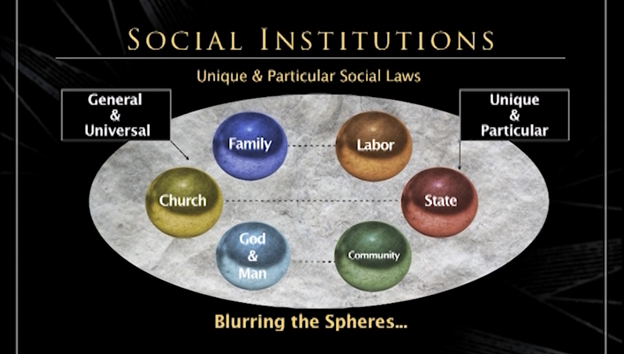This is part 8 of a 12-part series about The Truth Project, an in-depth Christian Worldview experience led by Del Tackett and published by Focus on the Family.
See overview here: The Truth Project Overview
Dr. Tackett opens this tour in The Truth Project with an unusual statement related to Jesus and his people. Jesus, in prophesying about his death and resurrection, said in John 14:19-20, “Yet a little while and the world will see me no more, but you will see me. Because I live, you also will live. In that day you will know that I am in my Father, and you in me, and I in you.”
In this passage, Jesus refers to the connection between individuals and people. In Latin, it’s called ‘unio mystica.’ In English, it’s called the ‘mystical union.’ This union means that people are united to God through Christ. In some mysterious way, Christians are connected to God in a way nobody else is.
Mystical Union Scriptures
There are several passages that teach this concept. Here are a few:
- “Therefore a man shall leave his father and mother and hold fast to his wife, and the two shall become one flesh.” This mystery is profound, and I am saying that it refers to Christ and the church. (Ephesians 5:31,32)
- “‘Therefore a man shall leave his father and mother and hold fast to his wife, and the two shall become one flesh.’” This mystery is profound, and I am saying that it refers to Christ and the church.” (Colossians 1:27)
- “I am the vine; you are the branches. Whoever abides in me and I in him, he it is that bears much fruit, for apart from me you can do nothing.” (John 15:5)
- “Therefore, if anyone is in Christ, he is a new creation. The old has passed away; behold, the new has come.” (2 Corinthians 5:17)
- “And I will ask the Father, and he will give you another Helper, to be with you forever, even the Spirit of truth, whom the world cannot receive, because it neither sees him nor knows him. You know him, for he dwells with you and will be in you.” (John 14:16,17)
Social Spheres Distinctions
After reviewing the mystical union, Tackett reminds us about the distinction between the various spheres that God ordained in the social realm. In his providence, God made differences between the various institutions: the family is not the church and neither is the church the state. Each social sphere is distinct and operates differently than other spheres.

Union with Each Other in Christ
In this mystical union, we also discover how we are unified with each other in Christ. There are several aspects of our unification with Christ.
- All Christians are part of the body of Christ. (1 Corinthians 12:27)
- Each member of Christ’s body belongs to each other. (Romans 12:4-5)
- Though we are many, we are still part of one body. (1 Corinthians 10:17)
- All things are to be brought together under Christ’s headship (Ephesians 1:9-10)
- Jews and Gentiles are unified together in Christ (Ephesians 3:6).
- There are no economic barriers with those in Christ (Galatians 3:28).
- There are no gender barriers with those in Christ (Galatians 3:28).
- Jesus’ prayer was for his people to be unified together in him (John 17:20-23)
God also wants believers to practice our unity with each other. The union Christians enjoy in theory should also be lived out. This is why there are so many “one another” verses found in the New Testament. For instance, God wants us to “love one another” (1 Peter 1:22), “bear one another’s burdens” (Galatians 6:2), “pray for one another” (James 5:16), “be kind to one another” (Ephesians 4:32), “admonish one another” (Colossians 3:16), and “live in harmony with one another” (Romans 12:16). In this way, we practice our unity as Christians.
Significance Outside of God
And yet, not everyone aims to commune with God through Christ. Most people are not Christians. Even worse, many are professed Christians who do not align themselves with God’s purposes with integrity. Historically, this category of people is called hypocrites. They claim to seek God while holding onto earthbound rewards. God rejects such half measures.
Historically, this category of people is called hypocrites. They claim to seek God while holding onto earthbound rewards. God rejects such half measures.
The Truth Project
Tackett reviews several passages, but one is the portion in the Sermon on the Mount where Jesus calls out hypocrisy among the Jews of his day. Matthew 6:1-4 records,
“Beware of practicing your righteousness before other people in order to be seen by them, for then you will have no reward from your Father who is in heaven. Thus, when you give to the needy, sound no trumpet before you, as the hypocrites do in the synagogues and in the streets, that they may be praised by others. Truly, I say to you, they have received their reward. But when you give to the needy, do not let your left hand know what your right hand is doing, so that your giving may be in secret. And your Father who sees in secret will reward you.”
The point of this citation is to identify the hypocrite class: those who act in seemingly righteous ways, but not for God. According to Tackett, they aim for significance in other people’s opinions about themselves, not God’s. In this way it’s a type of “prostitution” against God (Judges 2:17, etc.). So it’s not just a flippant, insignificant mistake. It’s a heinous crime against our maker.
Application: Eternal Life is Knowing God
Augustine of Hippo once wrote, “Our hearts are restless until they can find rest in you.” It is true that we all run after trivialities and significance. But we won’t find it outside of God. We can’t find it, because we’re not made for trivial things. Instead, we were made for something much bigger. We’re made for something more grand and more meaningful and eternal. We are made to commune with the living God through Jesus (John 17:17).
Header photo by Jackson David on Unsplash.








